
Sydney Rows
A Centennial History of the Sydney Rowing Club, 1970, by A L May
Table of Contents
Chapters
- Preliminaries: before 1870
- Foundations: 1870-1880
- New Clubs: 1880-1890
- The Amateur Question: 1890-1900
- Sydney on Top: 1900-1910
- Henley and War: 1910-1920
- Pearce and Mosman: 1920-1930
- Financial Problems: 1930-1940
- War and Wood: 1940-1950
- Strength and Stability: 1950-1960
- On Top Again: 1960-1970
Appendices
9. War and Wood: 1940-1950
The 1946/47 season was a most difficult one for Sydney, with no rowing premises being available for the major portion and crews having to row from other clubs. The champion four was reintroduced during the season and was duly won by Haberfield, with North Shore second. (At the same regatta, the maiden fours was won by a Glebe crew comprising the brothers Allan, Jack, Walter and Albert Kyd.)
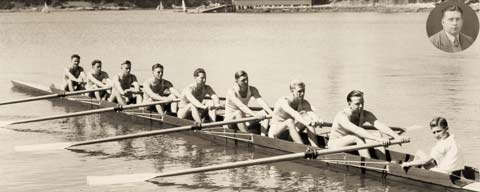
Sydney's champion junior eight of 1947-48
A large number of crews visited Melbourne for the revival after the war of the Henley-on-Yarra regatta. They included a Union of Old Oarsmen crew - Bromley, Dixon, Gould and Grace - which won a heat of the Stewards' fours but clashed and broke an oar in the semi-final. Haberfield won the Grand but Webb was easily beaten by Ron Rawlins in the sculls. Much interest attached to the clash at Sydney's regatta of Wood and Webb over 2000 metres, and Webb scored a shock 1 1/2 length win. Haberfield's senior eight won again, while Sydney won the junior fours with the crew of Bill Andrews, Dick Browne, Graham Montgomerie and Russ Rees.
The Sydney crew also annexed the champion junior fours, rowed at the Anniversary Regatta in January, 1947. Eight crews entered for the champion eights with Haberfield winning again with Sydney filling second place. Wood successfully defended his sculling title. Joe Gould was again appointed State selector and he retained only four Haberfield men - Robinson, Owen Ruffels, Webb and Cogle - adding Montgomerie of Sydney, Goswell of North Shore, Bartley of Mosman and Brown of Sydney University. Dr. Parkes was coach once again.
The race was scheduled to be rowed in Perth on Saturday, 3 May but, owing to adverse weather conditions, the races were postponed on four different occasions and were not rowed until late afternoon on the Monday, when an alternative course of two miles was used. NSW, rowing in SRC's new eight, was in the lead at the 1 1/4 mile mark, but Victoria handled the rough water then encountered to better effect to win by 1 1/4 lengths. A fine finish by WA failed by 1/4 length to catch NSW. Tasmania swamped. Wood beat Rawlins by 6 lengths in the sculls.
The Olympic Games set down for London in August, 1948, had a big influence on the 1947/48 season in NSW. As early as December, 1946, the successful Victorian coach, Ray Todd, was appointed sole Australian Olympic rowing selector. In May, 1947, the AARC decided that an eight would not be sent due to training and financial difficulties, but that a test race would be held for fours representing each State and that Todd would choose a sculler. Two emergencies would be chosen for the four and would compete in the pair-oar event. Todd soon nominated Merv Wood for the sculls.
Joe Gould was chosen to select the Olympic test race four for NSW. Four crews were selected to contest three trial races with the number 1 crew of Ruffels (bow), Webb, Goswell and Robinson doing best of all. (In the third series, however, victory very nearly went to the all-Sydney crew of Browne, Dixon, Montgomerie and Cayzer, with Kerr cox and Grounds coach.) Webb had to drop out of the final crew with. a strained back, and Alec Eddie went in.
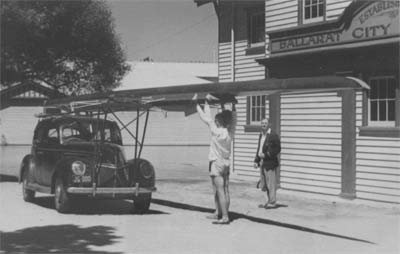
Sydney unloading their four at Ballarat test races
The test race was held on Lake Wendouree in January, 1948, and Victoria defeated the NSW crew by 3/4 length after a great battle. Todd chose the complete Victorian crew for the Olympics, together with Goswell and Ruffels as emergencies.
The ordinary NSW season had been progressing, meanwhile, a highlight for Sydney being the winning of the newly-instituted champion junior eights at the Nepean regatta in December (rowed on the Parramatta River due to flooding). The crew was boated W. Andrews (bow), D. Gray, P. Bounds, T. Schrader, G. Montgomerie, W. Foskett, R. Browne and P. Cayzer (stroke).
The major State championships were decided in February, 1948, with Haberfield winning the eights by 5 lengths from University with Sydney third. Wood had a 20 length win in the sculls. Before the King's Cup eight was chosen, the selector held a test race between the Haberfield eight and a composite crew, the winner to represent the State.
The second crew included six Sydney men - Andrews, Browne, Foskett, Montgomerie, Dixon and Cayzer (stroke), together with Tinning of Mosman and Ruffels of Haberfield. Arthur Chadwick was cox. The second crew led for two miles of the test race, but Haberfield took the lead to win by 2 lengths. And so Haberfield went out to represent NSW once again-and to great effect. The race was rowed on the Derwent, with choppy conditions delaying the start. WA led for a time, but NSW easily rowed past them to win by 1 1/2 lengths, with SA third 2 lengths further back. Wood won the sculls by 7 lengths, with Rawlins second once again.
Attention now turned to the English rowing scene. The Australian squad for the Games was reduced by one when insufficient funds were available for Ruffels to make the trip. It was to grow again, however. Spencer Grace and Ted Bromley travelled at their own expense to race in the Silver Goblets for coxswainless pairs at Henley and the Australian Olympic Federation agreed to add them to the Australian team for the Games if they reached the final of the Goblets or at the discretion of the manager of the team.
At the Marlow Regatta, the pair won and, at Henley, they won both the heat and the semi-final. In the final, they led at the mile when Grace became ill and collapsed. Merv Wood won both the sculls at Marlow and the coveted Diamond Sculls at Henley.
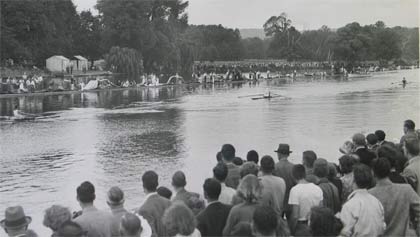
1948 Olympic Men's Scull Final
The rowing events of the Olympic Games were held over 1850 metres on the Henley course from 5-9 August, 1948. The highlight for Australia was again Wood - he sculled brilliantly to win his heat and semi-final, and went on to score an easy win in the final. Risso of Uruguay was 3 lengths back second. The coxed four was beaten in the heat and again in the repechage. Despite the fact that Grace was ill and in hospital until a few days before the race, the pair won through to the semi-finals before being eliminated. The eights and coxed fours were won by the USA, the double sculls and coxless pairs by Great Britain, the coxless fours by Italy and the coxed pairs by Denmark.
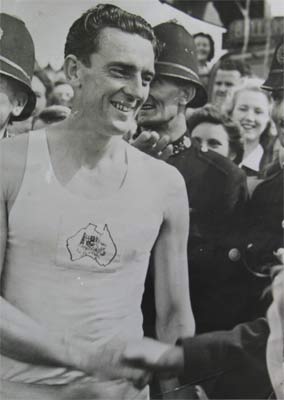
Merv Wood after winning the gold medal in 1948
The 1948/49 season in Sydney proved of great interest for a number of reasons. There was, to start with, an innovation in the preparatory winter season: the RA conducted three marathon events for scullers, fours and eights-from Sydney to Leichhardt and back. Webb won the sculling event and Sydney the fours. Sydney's eight did the fastest time, but was beaten on handicap.
A new regatta was added to the programme in 1948/49: the Metropolitan Regatta. The idea was that of Kevyn Webb and he acted himself as Regatta Secretary and Organiser. In doing so, "he staged the best regatta that has been seen in this State". Thirty-three events were held during the all-day regatta. Entries were received from crews from NZ, Victoria and Queensland, as well as from NSW, for the rowing events, 17 surf clubs took part in surf boat and surf ski events, a good entry was received for speed boat races, and the Royal Aero Club of NSW staged an aerial display. The regatta was held on the Sydney course in December (with SRC donating the day's profits to the Association).
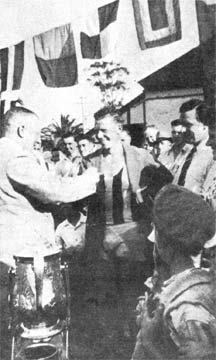
Kevyn Webb receives, the Cater Trophy from Harry Alderson after his win at the Sydney regatta
The NZ visitors comprised an eight and sculler from the Aramoho Boating Club, both winners of the 1948 NZ championships. They competed also at the warm-up Haberfield and Sydney regattas. At the former, Haberfield won the eights by 3/4 length from Aramoho, while Joe Schneider, the NZ sculler, won the sculls but only after Webb fell out of his boat when ahead 20 yards from the finish. At Sydney's regatta, the Aramoho eight showed the way to beat Leichhardt by 1 3/4 lengths with Sydney well back third and Haberfield failing to finish. Webb, the 1948 Henley-on-Yarra winner, won the sculls after Wood, a non-starter the week before, had clashed with Schneider and stopped rowing.
The 2000 metre champion eights of NSW were staged at the Metropolitan Regatta, with Melbourne Rowing Club also in the field. The NZ eight got to the front at half-way and stayed there, beating Haberfield by 1/2 length with Melbourne third and Sydney fourth. Wood led all the way in the 2000 metre sculling championship to beat Schneider by a length, with Webb a foot away third.
In other events, Sydney came second to Haberfield in the senior fours, while Reg Stride, now of Sydney, won the junior sculls and Bob Towns, also of Sydney, finished second to Cannon of Haberfield in the lightweight senior sculls. In the State championships in February, 1949, Sydney University won the eights title by 2 lengths from Sydney with Haberfield, whose coach, Dr. Parkes, had died a week beforehand, well back third.
Sydney went on to secure its sole championship of the season in the junior eights at the J. B. Sharp Memorial Regatta in March, the crew being W. Andrews (bow), G. Wright, P. Bounds, T. Schrader, H. House, R. Browne, D. Palmer and W. Mahoney (stroke), with Tom Chessell cox.
It was NSW's year in the King's Cup regatta. The State selector, Gould, chose five University men - Goswell, Selman, Longley, Pain and Brown-and three from Sydney - Tinning, Cayzer and Palmer - for his eight, with Montgomerie of Sydney the reserve. Bill Thomas of University was appointed coach and George Parlby manager for the Murray Bridge events. The King's Cup race assumed even more importance when it was resolved at the AARC meeting just beforehand that the winning crew would represent Australia at the February, 1950 Empire Games in Auckland, subject to inclusion in the crew of any other Australian oarsmen deemed by the selector to improve it.
NSW scored an excellent win in the interstate eights, taking the lead at the mile and drawing away to beat WA by 4 1/2 lengths, with Victoria close-up third. Wood, rowing at 14 stone, won the sculls by 350 yards from Williams of Victoria, giving NSW its sixteenth successive win in the event. According to one report, "Wood helped his opponents during the training period and, in his modest and gentlemanly fashion, taught them points he had learned during his reign as top amateur Australian and world sculler".
The last year of the decade was an exciting one for rowing men and a most successful one for SRC. The season had a pre-opening, with the holding of a spring Nepean Regatta which proved a great success. Haberfield commenced well in the senior events of the official season, while Leichhardt's "guinea pigs", selected by Professor Frank Cotton on his rowing "ergometer", annexed a number of maiden eights. At Haberfield's regatta, the "guinea pigs" moved up to junior fours and scored a 10 length win. Sydney had wins in the maiden eights, the lightweight maiden fours and the handicap sculls (Barry Green), and finished a close second to Haberfield in the senior fours.
Also worthy of note was the Glebe regatta at which a westerly gale blew up and 15 crews swamped. At the Metropolitan Regatta, Wood had an easy win in the 2000 metre champion sculls, although he and Murray Riley were beaten by Webb and Ron Rawlins for the double scull championship. Sydney entered no less than 22 crews for this regatta.
At the State championship regatta, the one "guinea pig" crew of Harrison, Maxim, Greenwood and Anderson turned in an outstanding performance by winning the champion junior fours by 8 lengths from Sydney and the champion fours by 2 lengths from Haberfield in the space of an hour and a quarter. Sydney's successful maiden eight was in the big NSW contingent for the 1949 Henley-on-Yarra, and the crew won the Founders' Challenge Cup for junior eights, albeit by one foot from Mercantile. Further success headed Sydney's way at the club's own regatta, when they won the lightweight champion eights of NSW.
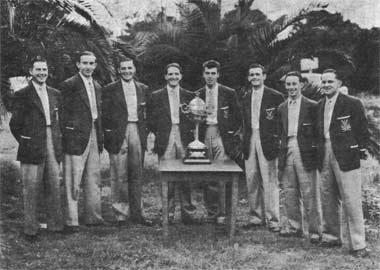
Winners of the Founders Challenge Cup at the 1949 Henley-on-Yarra regatta
(Left to right): A Thomas, K Foldi, P Hotten, A Williams, E Donald, J Ledingham, J Hackett and R Hatfield
Empire Games rowing now commanded attention. First there were the test races for the remaining classes of boat. The coxed four test race took place at Lake Wendouree, one week after Henley-on-Yarra. Sydney entered a four but did not start, and the Haberfield crew of Gee, Winkworth, Eder and Montgomery won from Leichhardt and six Victorian crews.
On the Nepean a week later, Wood scored an easy win in the sculls and the Wood-Riley combination disposed of Webb and Rawlins by 5 lengths in the double sculls. The coxless pair was declared no race, when interference followed the breaking down of the umpire's boat.
Selection finally went to the Victorian Olympians, Webster and Lambert. Webb was later added to the Empire Games squad as emergency while, in the eight, Don Palmer yielded his seat to P. Holmes a'Court of University, with Vic Middleton (University) joining Palmer as emergency.
The rowing events of the Empire Games were held at Lake Karapiro on 6 February, 1950. Australia won four of the five events and finished second in the fifth. The eights was a tremendous race with Australia and NZ never more than 1/2 length apart the whole distance. The wonderful finish saw Australia win by the margin of one foot, with England three lengths back third.
Wood was not extended to beat Tony Rowe of England by 2 1/2 lengths in the sculls, a South African sculler finishing third. Wood and Riley beat the Aramoho pair of Schneider and Simonson by 4 lengths in the double, and Australia won the pairs, again from NZ, by the same margin. The Australian four had, however, to bow to NZ by 2 lengths. Some 30,000 people watched the events, rowed in almost perfect conditions.
